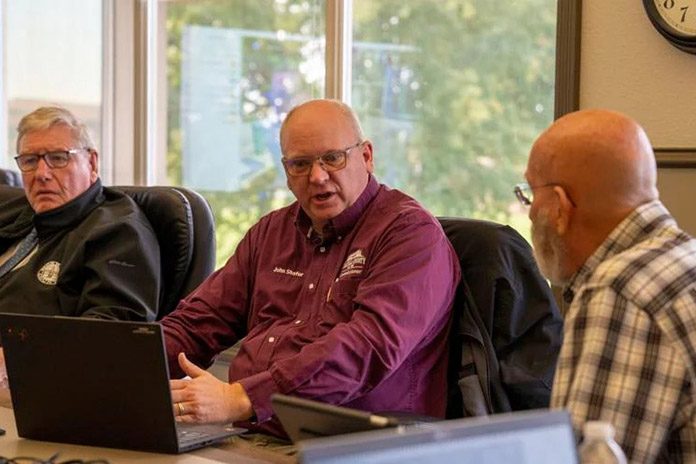
Columbia Development Authority board members John Shafer and Kim Puzey spent much of the regular meeting Tuesday, Oct. 22, at odds over the lawsuit from Umatilla County against the Port of Umatilla.
Shafer, vice chair of the board and Umatilla County commissioner, during the meeting in Boardman said he’d been trying to get a motion onto the agenda that Puzey, board chair and Port of Umatilla manager, had refused to add. Puzey said he didn’t see the request, and later said the motion had been on the agenda twice already and hadn’t passed.
The two are on opposing sides of a legal conflict over the CDA board’s March decision to give industrial land to the ports of Umatilla and Morrow. The vote was split 3-2, with Morrow County siding with the two ports against Umatilla County and the Confederated Tribes of the Umatilla Indian Reservation. Shafer claims the vote was illegal.
Umatilla County filed a suit against the CDA July 2 over the vote.
Motion for a motion
During the Oct. 22 meeting, Shafer said he had a way to resolve the conflict over industrial lands, which he thought would appeal to everyone on the board.
When Puzey pressed for details, Shafer said he wanted to get feedback on the idea from Joe Taylor, representing the Port of Morrow and the newest CDA board member, and to bring it to another member of the board would create a serial meeting — a meeting about a public decision that happens outside of an open meeting and without minutes.
CDA alternate for the Port of Umatilla Robert Blanc asked if it would be possible to sit down in his role at the port with the county to see if there is a solution that doesn’t require lawyers.
“If there’s a way to come to a consensus, come to an agreement, then we could sit down and try to work that out,” he said to Shafer, “and maybe accomplish the same thing that you’re trying to do with rescinding the vote, by getting together and trying to work something out.”
Because of the risk of a serial meeting and the item not being on the agenda, Shafer again chose not to share his proposal.
“You’ve called me a liar repeatedly over the radio waves,” Puzey said, “and I understand where you’re coming from on that.
Puzey also said he’s told Shafer “repeatedly, over, and over, and over” that he’d work with him, but the lawsuit gets in the way.
“I have never called you a liar, ever,” Shafer responded. “I said you negotiated in bad faith, but I’ve never called you a liar.”
If Puzey wants to work together, Shafer said he should add his motion to the agenda.
Eventually, J.D. Tovey, representing the tribes, made a motion to add Shafer’s proposal to the agenda during November’s monthly meeting for the board to discuss. Despite Puzey’s initial comments, Tovey’s motion passed unanimously.
Smith’s performance evaluation forthcoming
Before the board argued about Shafer’s motion, it moved forward with assigning two members — Puzey and Taylor — to create an evaluation form in collaboration with Greg Smith, CDA executive director, to present to the board for approval at the next meeting, Nov. 26.
This is a change from the original plan made Sept. 20, which was to have the evaluation form completed in early October. The board pushed back the timeline for the form to figure out what entity actually employs Smith — the Port of Morrow or the Columbia Development Authority.
Puzey said he hopes to find a way to see the salaries of Smith and Debbie Pedro, executive assistant, restored to what was approved during the June CDA meeting as part of the grant approval process.
“I personally would like to see the staff back to the salary that was recommended in the contract we got from the federal government,” he said. “And I think they were doing an awesome job.”
The CDA board at its Sept. 20 meeting, which Puzey missed, reversed the raises and required employees to return retroactive pay.
Smith said during the Oct. 22 meeting the staff will “be diminished even further in short order” as Emily Collins, CDA project coordinator, soon will move to part time, and Pedro is on leave until January.










